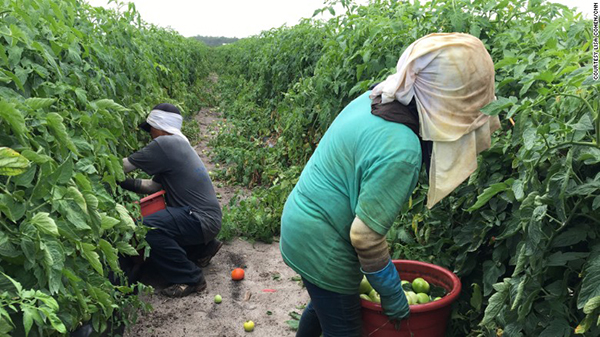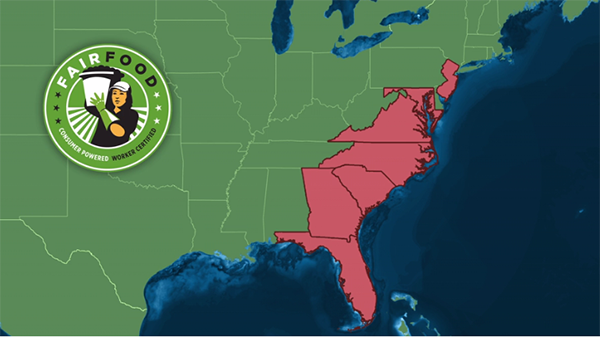Alejandrina Carrera, worker on FFP farm: “You’re not going to be harassed, you’re not going to be insulted, you’re not going to be forced to work. There’s more respect now.”
In an exceptional video series, CNN Freedom Project lifts up FFP as “most comprehensive social responsibility program in U.S. agriculture”…
This week, the award-winning team at the CNN Freedom Project — a new series designed to “amplify the voices of the victims of modern-day slavery, highlight success stories and help unravel the tangle of criminal enterprises trading in human life” — turned its spotlight on the CIW and the Fair Food Program, and the result is nothing short of stunning. With a remarkable economy and clarity of presentation, the three-part video report manages to capture both the unique interplay of the Fair Food Program’s multiple monitoring and enforcement mechanisms and the transformative impact of the Program on workers’ lives every day in the fields. Together, the three short videos depict the dramatic genesis of dignity and respect in a place where unimaginable abuse had been the norm for generations.
The Freedom Project team spoke with partners at every level of the Fair Food Program. Traveling from the tomato fields of Florida to the produce aisles of Whole Foods, the report documents workers’ stories of the unprecedented changes in Florida’s tomato industry, the CIW’s unique worker-to-worker education process, the Fair Food Standards Council’s in-depth auditing and enforcement efforts, the participating growers’ investments in creating a safe and respectful work environment, and the participating buyers’ critically important commitment to back the Program’s human rights-based code of conduct with real market consequences for growers who violate the code.
It bears mention that the CNN report comes just days after Ohio State University administrators opted to support OSU’s corporate neighbor Wendy’s over the Presidential Medal-winning FFP. Wendy’s declined to do an on-camera interview with the CNN crew, but the story of the company’s resistance to joining the FFP figures prominently in the report’s third segment, which focuses on the Campaign for Fair Food. The report’s harrowing portrayal of forced labor and sexual assault in Florida’s fields before the advent of the FFP should serve as a powerful cautionary tale to OSU administrators, as Wendy’s hands-off approach to social responsibility in Mexico — where labor conditions are far, far worse — has little or no chance of stemming the tide of human rights violations in that troubled country’s fields.
This morning, we are posting the first of the report’s three videos, a story that focuses on Alejandrina Carrera, a worker who has been harvesting Florida tomatoes since the age of fourteen and has experienced the very worst, and very best, of the tomato industry over the past two decades. Alejandrina’s is at once a disturbing and uplifting story, expertly told. We will post the second and third videos from the CNN report next week.
For now, here below is an extended excerpt from the text that accompanies the report. The must-see video, if you have not watched it yet, is at the top of today’s post:
Immokalee, Florida (CNN) – Alejandrina Carrera is covered from head to toe.
Long pants tucked into her shoes. Long sleeves tucked into her gloves. And layers of material covering her entire head and face, a protective shield against the brutal south-Florida sun.
Today, the oppressive heat is her only worry.
Yet that wasn’t the case when Carrera first came to the United States from Mexico 20 years ago, a migrant farmworker in search of a better life. She was just 14 years old, scared, vulnerable, and alone.
“I was very young, I didn’t have my father or mother, no one,” she says.
Carrera says she found work on a farm, and it wasn’t long before her supervisor tried to take advantage of her. He promised her an easier job inside a warehouse. But as soon as she got in his truck, she says, he drove to a remote part of the farm and tried to force her to have sex with him.
“He told me if we don’t do this the easy way, we’ll do it the hard way. I was afraid and trembling,” she says.
Now 35, Carrera recalls with gratitude the farmworker who heard her screams and rescued her before she could be raped. She also remembers how they both were fired the next day.
Protections against that type of labor abuse against migrant workers in the United States were virtually non-existent in the 1990’s.
“No one knew anything about rights,” Carrera says. “We didn’t seek out what our worker rights were. We just accepted everything they told us and just did our jobs.” […]
[…] Today, the CIW’s focus is no longer uncovering cases of slavery. Instead, it’s aim is preventing them from happening in the first place through an initiative it calls the Fair Food Program.
Participants in the program, which include 90% of tomato growers in Florida, allow CIW staff to come onto their properties and hold mandatory education sessions for all employees. The workers receive booklets that outline their rights and a hotline to call if they experience violations.
The growers also agree to regular third-party inspections of their farms. When they visit, a team of auditors speaks confidentially with at least 50% of workers to ensure their rights are being respected.
Laura Safer Espinoza is a former Supreme Court Justice for the State of New York. She now spends her retirement in Florida, running the Fair Food Standards Council, which oversees the audits.
“Places that were called ground zero for modern day slavery by federal prosecutors a few years ago are now cited by national and international human rights experts as the best work environment in U.S. agriculture,” she says.
As Judge Laura explains, “if a participating grower is not complying with the code of conduct after multiple chances and opportunities with the Fair Food Standards Council to work toward compliance, ultimately they are suspended. That means they cannot sell their produce to now 14 major retail buyers.”
Those buyers include many of the biggest fast food restaurants and grocery stores, including McDonalds, Taco Bell, Whole Foods Market and Walmart. As part of the agreement, they all pledge to purchase tomatoes only from Fair Food Program farms.
They also agree to pay a penny more per pound of tomatoes, money that goes directly to the farmworkers as a line-item bonus. In some cases, it doubles their paychecks.
Alejandrina Carrera appreciates the extra money, but is most grateful for the change in how she is treated on the job.
“You’re not going to be harassed, you’re not going to be insulted, you’re not going to be forced to work. There’s more respect now,” she says.
Carrera came to Immokalee dreaming of a better life for herself. Today she dreams of a better life for her three children. They are all in school and she wants them to go on to college and have careers.
Her youngest kids are seven and nine. The oldest is 14, the same age she was when she first came to Florida.
Head over to the CNN International website for the full video series on the Fair Food Program.



